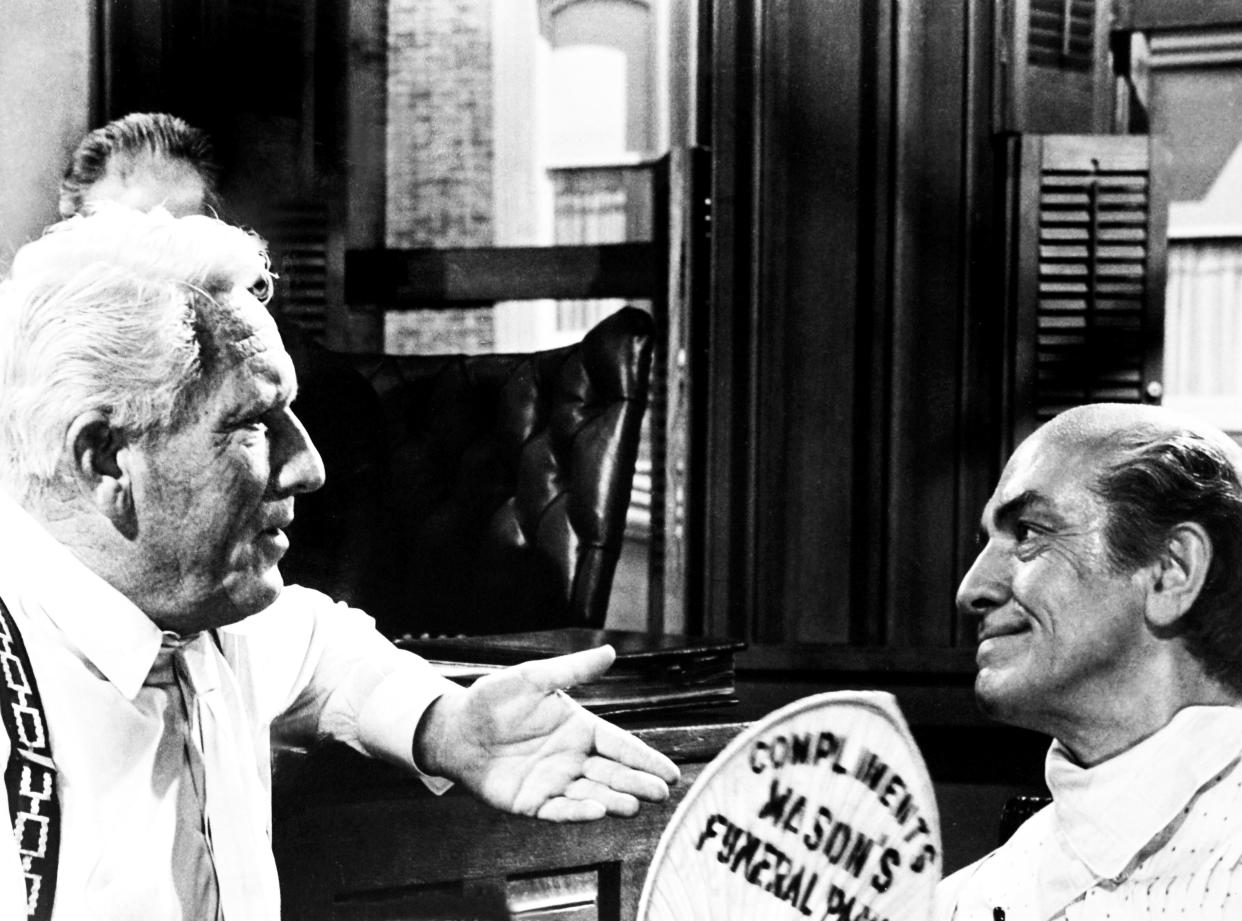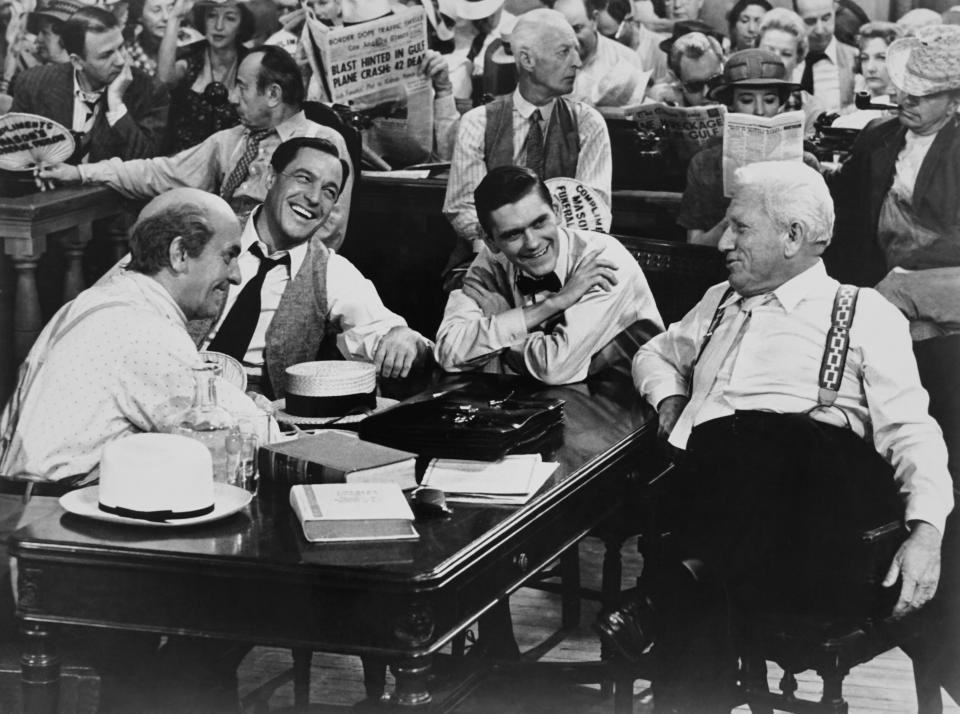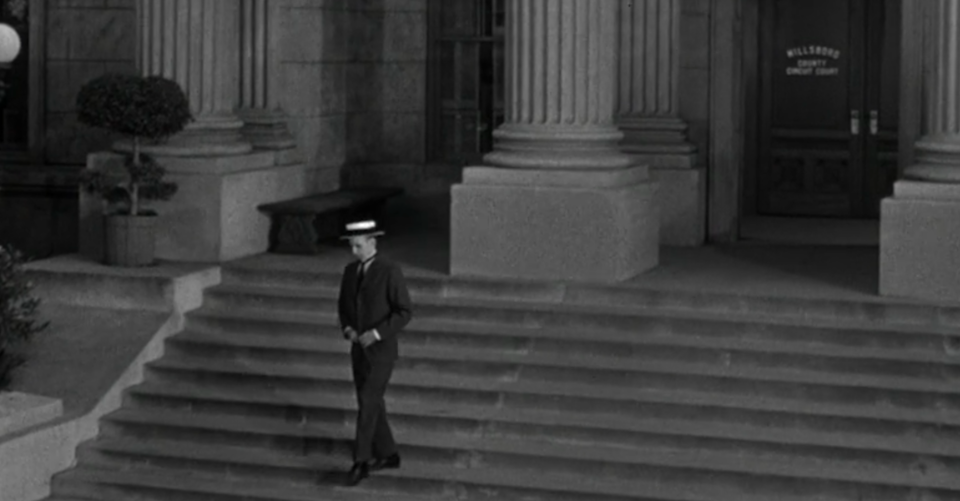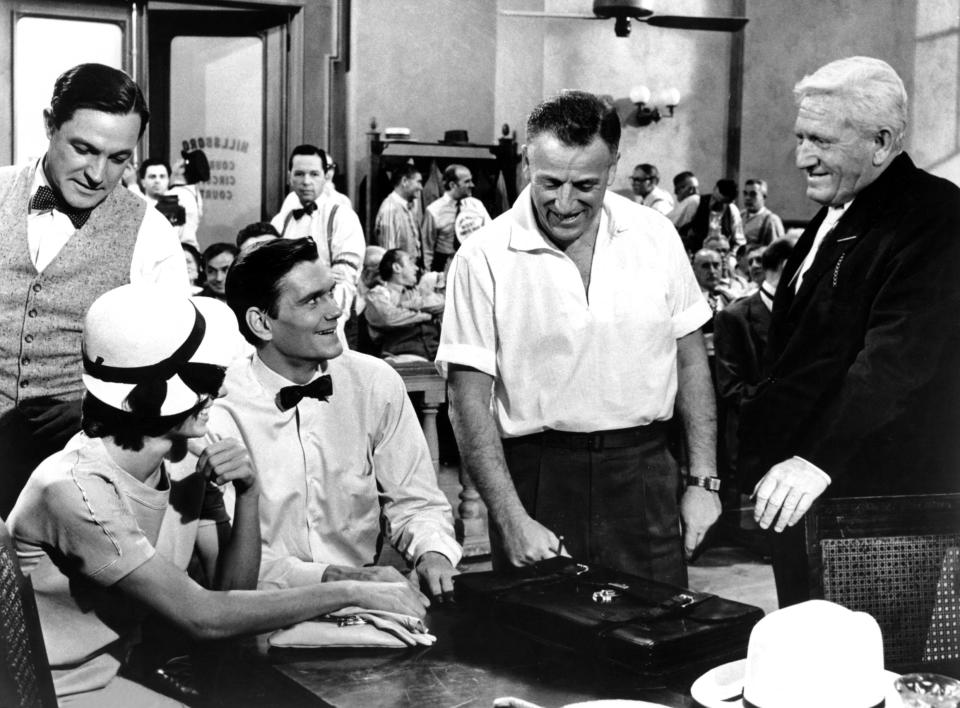How 'Inherit the Wind' and the Scopes Monkey Trial predicted our coronavirus summer

The coronavirus pandemic has effectively canceled summer vacation as America knows it, delaying blockbuster movies, closing theme parks and scrambling travel plans. Even as infection rates rise around the country, and leading medical experts, like Dr. Anthony Fauci, issue dire warnings about the importance of social distancing and wearing masks, a significant segment of the country’s population continues to challenge the science of the pandemic. Some of those challenges have come from struggling businesses like movie theaters, while others are rooted in claims that scientists’ recommendations clash with personal and religious freedoms. Churches are particularly eager to open their doors — and have been aided by President Trump, who declared them to be providing “essential services” in May — even as mounting evidence indicates that they’ve been a source of new coronavirus cases. The conflict between religious freedom and scientific fact has since played out in courtrooms around the country as churches have sued to reopen in the face of stringent medical guidelines.
Ninety-five years ago, the nation was riveted by another trial that pitted religion against science. On July 10, 1925, Judge John Raulston gaveled to order The State of Tennessee vs. John Thomas Scopes in the Rhea County Courthouse in Dayton, Tenn. Popularly known as the Scopes Monkey Trial, the case was initiated after high school teacher John Scopes knowingly defied Tennessee’s recently passed Butler Act, which issued a statewide ban against the teaching of Charles Darwin’s theory of evolution that the 19th century scientist outlined in On the Origin of Species and The Descent of Man. Prosecuting the case on behalf of Tennessee was famed orator, three-time presidential candidate and avowed Christian fundamentalist William Jennings Bryan. Scopes’s defense was led by the sharp-minded lawyer, early American Civil Liberties Union ally and staunch agnostic Clarence Darrow.
Unfolding during a particularly hot Tennessee summer, from July 10 to July 21, the Scopes Monkey Trial was later immortalized in Jerome Lawrence and Robert E. Lee’s play Inherit the Wind, which had its Broadway premiere in 1955, three decades removed from the events in Dayton. Five years later, Stanley Kramer directed a celebrated feature film adaptation starring Fredric March and Spencer Tracy that celebrates its 60th anniversary this month. The movie had its premiere in Dayton on July 21, 1960 — 35 years to the day after Scopes was found guilty and sentenced to … a $100 fine.

Neither the play nor the movie is a word-for-word transcript of the trial, altering certain events and inventing entire characters. Even the names have been changed: In the film, future Bewitched star Dick York plays Hillsboro (not Dayton) schoolteacher Bert Cates, while March and Tracy portray Bryan and Darrow’s stand-ins, Matthew Harrison Brady and Henry Drummond, respectively. Still, Inherit the Wind’s version of events has shaped how we collectively remember the trial and inspired an entire genre of big-screen legal dramas. Watching Kramer’s movie today — with its dramatic legal maneuvers, culminating in a stunning cross-examination between Tracy and March — you can draw a direct line to such cinematic courtroom heavyweights as The Verdict, A Few Good Men and A Time to Kill.
Interestingly, the central difference between the Scopes Monkey Trial and its dramatized counterpart is the extent to which many in Dayton were aware that they were participating in a kind of show business production. As a 2005 timeline published by NPR lays out, as soon as the Tennessee Legislature passed the Butler Act in March 1925, the nascent ACLU — which had been founded five years previously — made it known that it was eager to challenge the law in state court. Town leaders within the economically challenged Dayton, including businessman George Rappleyea, decided to seize the national spotlight offered by a blockbuster court case. Scopes, a popular football coach and substitute biology teacher, agreed to be their handpicked defendant, and instructed his students to testify in front of a grand jury that he had taught them evolution in a classroom setting. An indictment was handed down on May 25, by which point Bryan and Darrow had already announced their presence at the impending trial.

As July 10 approached, Dayton saw its fortunes rise as Rappleyea hoped they would. In addition to the legal teams, the town was flooded with religious revivalists, get-rich-quick opportunists, eager onlookers and newspaper journalists. The trial was also broadcast live on the radio, and film cameras captured footage outside the courthouse for movie house newsreels. In that way, the Scopes Monkey Trial was one of America’s first court cases to be tried in the emerging mass media, and both Bryan and Darrow were cognizant of playing to an audience beyond the judge, jury and courtroom. Before the trial began, Bryan described it with the kind of hyperbole later reserved for the Super Bowl or a Marvel Studios blockbuster: “The contest between evolution and Christianity is a duel to the death. It has been in the past a death struggle in the darkness. From this time on it will be a death grapple in the light. If evolution wins in Dayton, Christianity goes — not suddenly, of course, but gradually — for the two cannot stand together. They are as antagonistic as light and darkness, as good and evil.”
Echoes of those words can be heard among certain present-day critics of preventive measures like mask wearing, who couch their objections in grandiose religiosity. “This is the greatest nation on earth founded on Judeo-Christian Principles,” Ohio state Rep. Nino Vitale reportedly wrote on his Facebook page. “One of those principles is that we are all created in the image and likeness of God. That image is seen the most by our face. I will not wear a mask.” Other protesters have embraced the anger displayed by the anti-Darwin townspeople who march through Inherit the Wind as they have wrecked mask displays in Target stores or engaged in furious public outbursts.
Despite Bryan’s rhetoric, the actual courtroom drama fell short of biblical proportions, at least at first. As the trial unfolded, Darrow repeatedly butted heads with Judge Raulston, who overruled his attempts to call expert witnesses, as well as his motion to have the Butler Act declared unconstitutional. On the penultimate day, though, Darrow called Bryan himself to the stand on the grounds that he self-identified as an expert on the Bible, and the ensuing cross-examination proved the fireworks many were hoping for. Due to the stifling heat, the matchup of legal minds took place outdoors, and thousands reportedly watched as Darrow studiously dismantled Bryan’s bluster. After a spirited exchange about the exact date of the great flood described in Genesis, Bryan famously declared in tortured testimony: “I do not think about things I don’t think about.” Ever quick on the uptake, Darrow replied, “Do you think about things you do think about?” and set off waves of laughter in the crowd. (Not surprisingly, that is one historical exchange that is repeated almost verbatim in the movie.)

As written for the stage by Lawrence and Lee and adapted for the screen by Nedrick Young and Harold Jacob Smith, Inherit the Wind (which takes its title from a biblical verse) follows the same slow build toward the climactic showdown between its two acting titans. The film opens with a minute-and-a-half long crane shot that starts on the steps of the Hillsboro Courthouse before pulling back to reveal a town square that’s empty save for a small group of men en route to the high school where Bert Cates is about to start his fateful lesson. A dirge-like rendition of “Give Me That Old Time Religion” — one of two Gospel spirituals that are heard regularly in the film, often in a menacing key — contributes to the foreboding mood. (Fun fact: A quarter century after Inherit the Wind, the Hillsboro Courthouse became the Hill Valley Courthouse where Marty McFly traveled back to the future in Robert Zemeckis’s 1985 comedy classic.)

Unlike Scopes, it turns out that Cates is acting of his own accord in teaching Darwin to his students. “I’m not trying to prove anything — all I want to do is teach my students that man just wasn’t planted here like a geranium in a flowerpot,” he tells his fiancée, Rachel (Donna Anderson), the daughter of the town’s religious leader, the Rev. Jeremiah Brown (Claude Akins), who is the most vocal proponent of prosecuting Cates, even in the face of national scorn. “Heaven has chosen us to show the way, to light the road for others,” Brown argues, to the glee of his devoted followers and the skepticism of a handful of prominent citizens.
Reframing the origins of the Scopes Trial as a clash between an intolerant community and a lone progressive voice in the wilderness complemented Kramer’s own interests as a storyteller. Eight years earlier, he produced the Gary Cooper classic High Noon, which embedded an explicit critique of McCarthyism in the context of a traditional Western. Kramer’s four directorial efforts that preceded Inherit the Wind also wrestled with era-defining social issues. They included 1958’s The Defiant Ones, which starred Tony Curtis and Sidney Poitier as escaped convicts on the run in the segregated Deep South, and 1959’s On the Beach, an unnerving depiction of a post-nuclear-apocalypse Earth. With a few notable exceptions, he continued in that vein for the rest of his career, to the point where he was criticized for churning out middlebrow “message movies” like Guess Who’s Coming to Dinner. But Kramer always saw social and political commentary as a natural extension of filmmaking. “The motion picture maker, whether he likes it or not, is thrust very much into the political arena these days,” he remarked in an audio interview included on a Dinner DVD featurette.

While the clash between religion and science is the explicit subject of Inherit the Wind, the film’s repeated references to the freedom of thought and the equality of ideas speak directly to the burgeoning civil rights movement, which would come to dominate the 1960s. Kramer’s canny choice to cast Tracy as Drummond ensures that those progressive arguments are delivered with all the forceful authority that the screen legend could summon. (Tracy received his seventh Best Actor nomination for the role; by the time of his death in 1967 he had been nominated nine times, an Oscar record that Laurence Olivier tied in 1978.) It’s no accident that Drummond is frequently glimpsed in the company of Cates’s teenage students, stand-ins for the high school and college students who were using their summers to join sit-ins and marches across the South at the same time that Inherit the Wind was playing in theaters.
Even as March matches Tracy in intensity throughout the film, Brady never really stands a chance in their battle of wits, as his friend-turned-foe Drummond tells him he’s a man who’s standing still while the country around him has moved on or, more accurately, evolved. He’s able to divert attention from that at first by playing to his followers’ prejudices about small-town values trumping big-city elites and using the media as both a megaphone and a punching bag. “The attacks upon me stem from a vociferous minority, which happens to control the press,” he says at one point, a more elegantly phrased version of an attack that’s frequently heard emanating from the White House now. (The press is represented in the film by Gene Kelly’s grinning journalist, in a rare dramatic turn for the movie musical icon.) Brady’s place in the world is fully revealed in his final scene: After the verdict has been read and the trial adjourned, he prepares to deliver another sermon, only to be drowned out by the cacophony. In a subtle inversion of the film’s opening shot, Kramer pulls the camera back above the crowded courtroom as people mill about in a swirl of constant motion, all while March remains painfully, tragically in place.
In another departure from the historical record, Brady collapses and dies immediately following the guilty verdict, whereas Bryan passed away in his sleep five days later. Meanwhile, Drummond, like Darrow — who used his closing speech to request that the jury find Scopes guilty — announces immediate plans to appeal the decision. Two years later, the Tennessee Supreme Court upheld the Butler Act but overturned the Scopes verdict, preventing the case from going to the U.S. Supreme Court. Still, the larger verdict was in: Even as two additional states, Mississippi and Arkansas, moved to ban the teaching of evolution, 22 others rejected similar bills as public opinion shifted firmly in favor of Darwin’s inclusion in school curriculums.
In 1967 — the same year that Kramer directed Tracy in his final film role in Guess Who’s Coming to Dinner — Tennessee officially repealed the Butler Act, and the Supreme Court followed by striking down Arkansas’s version of the law one year later. Darrow died in 1938, but Scopes lived to see both Inherit the Wind and the overturning of the Butler Act, dying in October 1970. Kramer’s film, which is currently streaming on Amazon, has since been remade three times, most recently as a 1999 made-for-TV movie with Jack Lemmon as Drummond and George C. Scott playing Brady.
Ninety-five years after America’s Scopes-dominated summer, church-filed lawsuits challenging coronavirus measures have made headlines in states like California, New Jersey, Oregon and Michigan. In late May, the Supreme Court declined to weigh in on the California case in a closely watched 5-4 decision. But rising infection rates through June and July have already led states to roll back reopening plans or stay the course with existing restrictions recommended by medical experts. That opens the door to additional cases, which have a chance of reaching the ideologically divided court again in the coming months.
Following the California decision, Trump-appointed Justice Brett Kavanaugh wrote a dissenting opinion claiming that the state’s current policy “indisputably discriminates against religion.” The administration has made its allegiance clear as well. On June 23, Trump spoke in front of a largely mask-free audience at a megachurch in Phoenix, Ariz., one of the states where infection rates have soared. Employing Brady-like sentiments, he blamed “the fake news people” for overhyping the virus, and promising — despite all evidence to the contrary — that “it’s going away.” To borrow a line from Drummond, though, science can’t be wished away by standing still.
For the latest coronavirus news and updates, follow along at https://news.yahoo.com/coronavirus. According to experts, people over 60 and those who are immunocompromised continue to be the most at risk. If you have questions, please reference the CDC’s and WHO’s resource guides.
How to maintain your physical and mental health during the pandemic
Taking care of a loved one with COVID-19? Here’s how to stay healthy
Q&A with Dr. Kavita Patel: How to keep your family safe and maintain your mental health
Inherit the Wind is currently streaming on Amazon.
Read more from Yahoo Entertainment:



